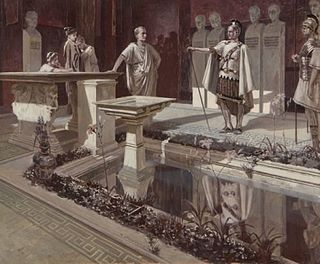Related Research Articles

The 60s decade ran from January 1, AD 60, to December 31, AD 69.

Plautia Urgulanilla was the first wife of the future Roman Emperor Claudius. They were married circa 9 AD, when he was 18 years old. Suetonius writes that they were divorced in 24 AD on the grounds of her scandalous love affairs and the suspicion of murder.

Aulus Plautius was a Roman politician and general of the mid-1st century. He began the Roman conquest of Britain in 43, and became the first governor of the new province, serving from 43 to 46.

Vipsania Agrippina was the first wife of the Emperor Tiberius. She was the daughter of Marcus Vipsanius Agrippa and Attica, thus a granddaughter of Titus Pomponius Atticus, the best friend of Cicero.
Publius Petronius Turpilianus was a Roman senator who held a number of offices in the middle of the 1st century AD, most notably governor of Britain. He was an ordinary consul in the year 61 with Lucius Junius Caesennius Paetus as his colleague.
Gaius Sallustius Passienus Crispus was a prominent figure in the Roman Empire during the first century. He held the consulship twice, and was stepfather of the future emperor Nero.
Pomponia Graecina was a noble Roman woman of the 1st century who was related to the Julio-Claudian dynasty. She was the wife of Aulus Plautius, the general who led the Roman conquest of Britain in 43 AD, and was renowned as one of the few people who dared to publicly mourn the death of a kinswoman killed by the Imperial family. It has been speculated that she was an early Christian. She is identified by some as Lucina or Lucy, a saint honoured by the Roman Catholic Church.
Titus Flavius T. f. T. n. Sabinus was a Roman politician and soldier. A native of Reate, he was the elder son of Titus Flavius Sabinus and Vespasia Polla, and brother of the Emperor Vespasian.
Scribonia Magna, known in modern historical sources as Scribonia Crassi, was a Roman noblewoman. Scribonia was descended from Pompey.
Quintus Junius Arulenus Rusticus was a Roman Senator and a friend and follower of Thrasea Paetus, and like him an ardent admirer of Stoic philosophy. Arulenus Rusticus attained a suffect consulship in the nundinium of September to December 92 with Gaius Julius Silanus as his colleague. He was one of a group of Stoics who opposed the perceived tyranny and autocratic tendencies of certain emperors, known today as the Stoic Opposition.

Marcia Furnilla was a Roman noblewoman who lived in the 1st century. Furnilla was the second and last wife of the future Roman Emperor Titus as well as the aunt of the future emperor Trajan.
Marcia was an ancient Roman noblewoman and the mother of the emperor Trajan.
The gens Vitellia was a family of ancient Rome, which rose from obscurity in imperial times, and briefly held the Empire itself in AD 69. The first of this gens to obtain the consulship was Aulus Vitellius, uncle of the emperor Vitellius, in AD 32.

The gens Antonia was a Roman family of great antiquity, with both patrician and plebeian branches. The first of the gens to achieve prominence was Titus Antonius Merenda, one of the second group of Decemviri called, in 450 BC, to help draft what became the Law of the Twelve Tables. The most prominent member of the gens was Marcus Antonius.
Aulus Plautius was a Roman politician and senator who was appointed Suffect consul during the reign of Augustus.
The gens Domitia was a plebeian family at ancient Rome. The first of the gens to achieve prominence was Gnaeus Domitius Calvinus, consul in 332 BC. His son, Gnaeus Domitius Calvinus Maximus, was consul in 283, and the first plebeian censor. The family produced several distinguished generals, and towards the end of the Republic, the Domitii were looked upon as one of the most illustrious gentes.
Plautius Lateranus was a Roman senator of the first century.

The gens Plautia, sometimes written Plotia, was a plebeian family at ancient Rome. Members of this gens first appear in history in the middle of the fourth century BC, when Gaius Plautius Proculus obtained the consulship soon after that magistracy was opened to the plebeian order by the Licinio-Sextian rogations. Little is heard of the Plautii from the period of the Samnite Wars down to the late second century BC, but from then to imperial times they regularly held the consulship and other offices of importance. In the first century AD, the emperor Claudius, whose first wife was a member of this family, granted patrician status to one branch of the Plautii.
Marcus Julius Vestinus Atticus was a Roman senator, who flourished under the reign of Nero. He was consul in the year 65 as the colleague of Aulus Licinius Nerva Silianus; after his suicide he was replaced by Publius Pasidienus Firmus.
References
- ↑ Alison E. Cooley, The Cambridge Manual of Latin Epigraphy (Cambridge: University Press, 2012), p. 460
- ↑ Anthony Birley, The Fasti of Roman Britain, Oxford: Clarendon Press, 1981, p 38f
- ↑ Suetonius, The Lives of the Twelve Caesars, Nero 35